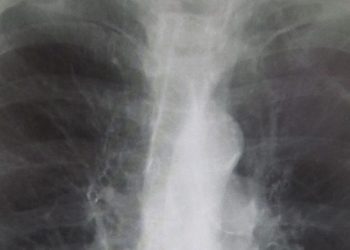A single glucocorticoid injection provides only short-term relief from chronic low back pain
1. Single glucocorticoid injections provided symptomatic relief from chronic low back pain after one month.
2. No differences in low back pain were observed between patients and controls after 12 months.
Evidence Rating Level: 1 (Excellent)
Study Rundown: Chronic low back pain (LBP) is known to cause long-term disability. One subtype of chronic LBP is active discopathy, where local inflammation contributes to patient symptoms. Based on this pathophysiology, current treatments being investigated for active discopathy include drugs that target local inflammation. As a result, the authors of this study aimed to assess the efficacy of a single glucocorticoid intradiscal injection (GC IDI) as treatment for such patients. In general, they observed that a single GC IDI reduces LBP only in the short-term. This study has several limitations. First, patients were recruited from tertiary care centers and may not be representative of the general population with active discopathy. Additionally, the dose regimen and properties of the glucocorticoid may have impacted the results of the study—the authors suggested that a dose-optimization schedule or less soluble glucocorticoid might be needed to optimize results. Overall, this trial suggests that GC IDI may have positive effects on patients in the short-term; however, the treatment efficacy is uncertain due to its insignificant long-term benefits.
Click to read the study in the Annals of Internal Medicine
Relevant Reading: The Affordable Care Act, Five Years Later: Policies, Progress, and Politics
In-Depth [randomized controlled trial]: The authors conducted a prospective, parallel-group, double-blind, randomized, controlled, multicenter study. Patients included in this study had daily LBP for at least 3 months, with mean intensity greater than 40 when ranked from 0 (no pain) to 100 (maximum pain). Patients were then randomly assigned to either the treatment or control group. The authors observed significant results in symptom relief at 1 month following GC IDI. For example, the percentage of responders (LBP intensity < 40) was higher in the treatment group (36 of 65 [55.4%]) than the control group (21 or 63 [33.3%]) (absolute risk difference 22.1 percentage points, 95%CI 5.5 to 38.7 percentage points, p = 0.009). In contrast, no significant difference in response was observed at 12 months, both in LBP intensity and in most secondary outcomes. These results suggest that GC IDI may not be an effective treatment for active discopathy in the long-term.
Image: PD
©2017 2 Minute Medicine, Inc. All rights reserved. No works may be reproduced without expressed written consent from 2 Minute Medicine, Inc. Inquire about licensing here. No article should be construed as medical advice and is not intended as such by the authors or by 2 Minute Medicine, Inc.







